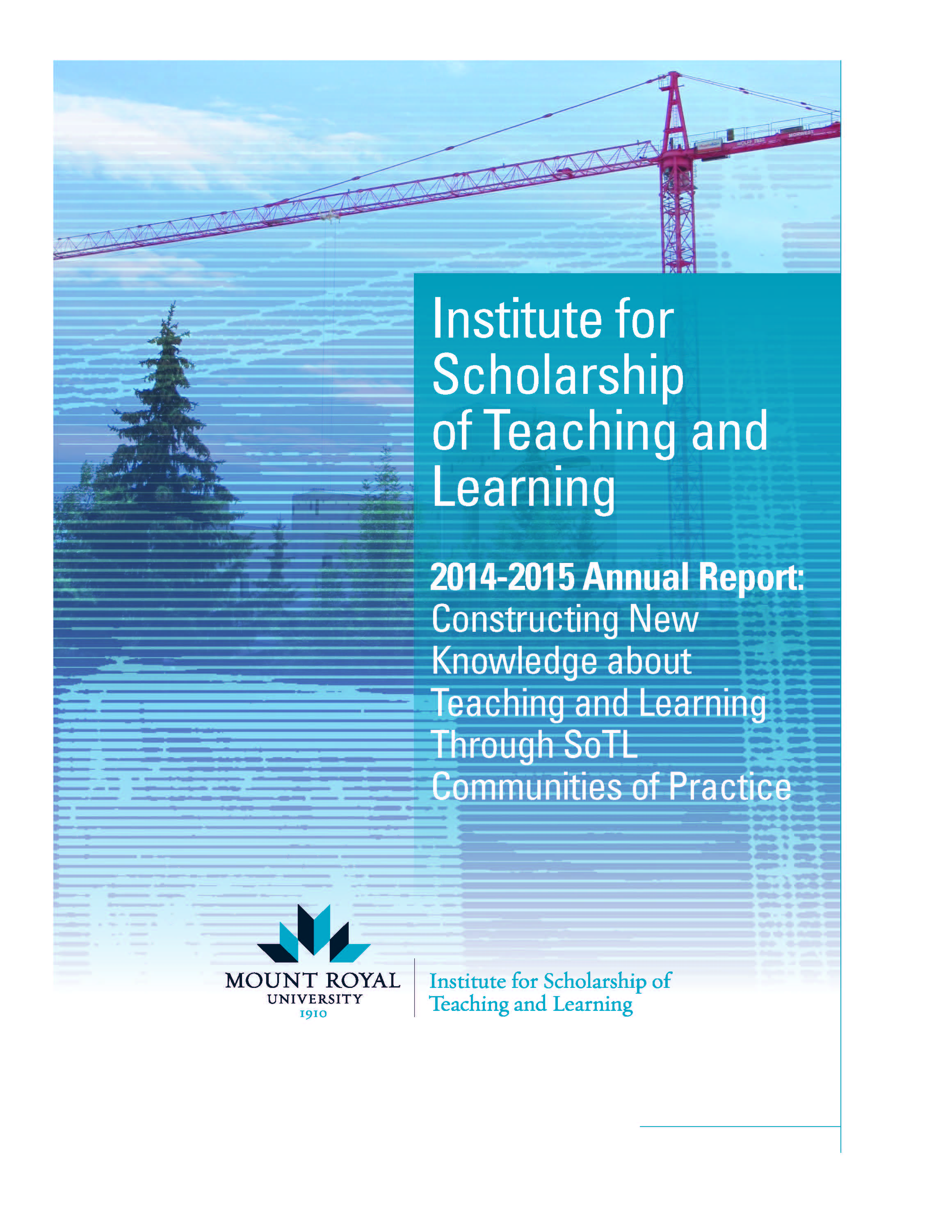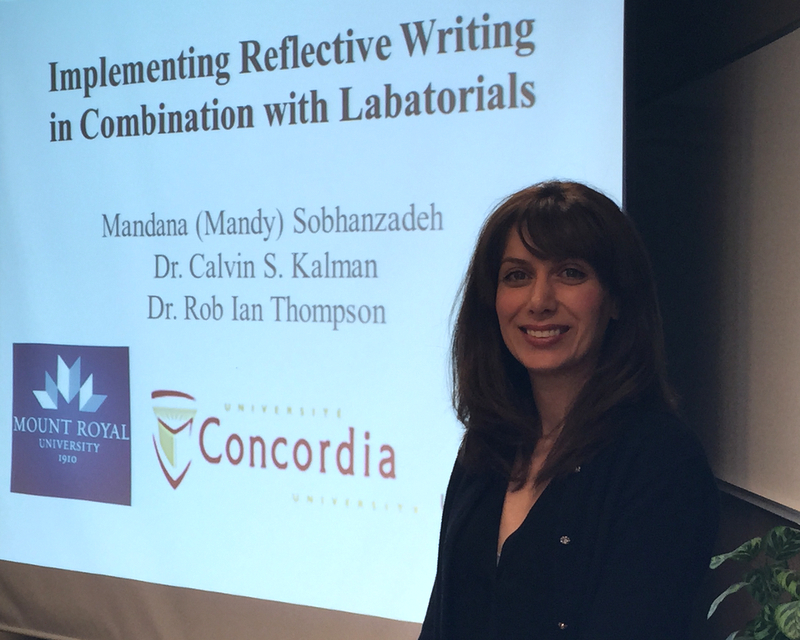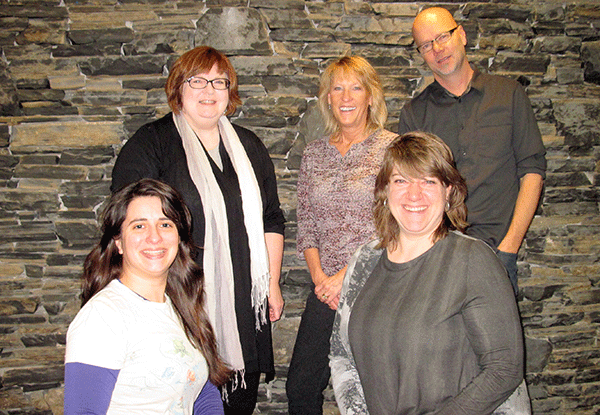application details for upcoming Nexen Scholars Program and TransCanada Collaborative SoTL grants
Our redesigned home website will launch soon (can’t wait!) but in the meantime I wanted to get these RFPs posted as soon as possible:
2016 Nexen Scholars Program
The Nexen Scholars Program brings together faculty from a range of academic disciplines committed to investigating and documenting significant issues and challenges in teaching and learning in higher education. The central work of the Nexen Scholars is to develop course-based inquiry projects, conduct research that sheds new light on a significant aspect of student learning, and share evidence and findings publicly in an effort to influence practice in the field.
Nexen Scholars are selected for a 16-month term, participate in an off‐site residency in February, and engage in monthly collaborative activities during the time that they develop and conduct their inquiries. The Nexen donation also supports Going Public Awards for scholars to present their work at conferences, as well as an optional data analysis residencies to assist scholars in furthering their work.
2016 Nexen Program Call for Proposals (due Dec 1 2015): 2016nexenscholarsrfp
Nexen Scholars Going Public Awards: 2015-16GoingPublic
Faculty who are considering applying are encouraged, but not required, to attend the following November presentation and to browse the Institute website for resources and information about previous projects:
Nexen Program Scholars’ Showcase
Fri Nov 6 2015, 12:30-1:30 in T107
Presented by 2015 Nexen Scholars: Collette Lemieux (Bissett), Brad Quiring (Bissett), Sheri Rhodes (International Education), Joanna Szabo (Nursing), Priscilla Wamucii (General Education), and Janice Miller-Young (Institute)
TransCanada Collaborative SoTL Inquiry Grants
TransCanada Collaborative SoTL Inquiry Grants are designated for collaborative teaching and learning inquiry projects which go beyond an inquiry about teaching and learning in a single class. Note that while the Nexen Scholars Program is designed to support scholars in developing a project, the TransCanada grants require a complete research proposal including literature review, research question, methodology, data collection, and dissemination plans. (If your proposed work does not align well with this structure, please include a clear statement of theory and methods that are aligned with the proposed project.) Eligible projects must propose systematic, evidence-based study of teaching and learning and meet principles of good practice in SoTL (Felten, 2013).
Collaborative SoTL projects are expected to be in the range of $5,000-$10,000 (i.e. bigger than what an internal research grant would reasonably support) and may be conducted over one or two years.
TransCanada grant application guidelines (due October 31): Collaborative-Research-Grant-guidelines-updated Sept2015
To apply for TransCanada Collaborative SoTL Inquiry Grant, Principal Investigators must use the Office of Research Services web-based application, which requires the completion of a Research Tracking Form, description of the project, co-investigator team and dissemination plan, and the uploading of a complete research proposal.
I-SoTL updates and upcoming opportunities
 I just finished the Institute’s annual report (MRU ISTL ANNUAL 2015-for web) and am feeling fortunate to know and work with so many colleagues doing excellent work related to understanding and improving teaching and learning at Mount Royal and beyond! I think that Mount Royal has built a strong community and quite a bit of momentum for SoTL work and I’m looking forward to what the future will bring. The full report is attached, and here are some highlights:
I just finished the Institute’s annual report (MRU ISTL ANNUAL 2015-for web) and am feeling fortunate to know and work with so many colleagues doing excellent work related to understanding and improving teaching and learning at Mount Royal and beyond! I think that Mount Royal has built a strong community and quite a bit of momentum for SoTL work and I’m looking forward to what the future will bring. The full report is attached, and here are some highlights:
- 5th annual Symposium on SoTL included over 50 presentations and 115 participants from across North America
- 10 students hired as research assistants for Nexen and TransCanada-sponsored SoTL projects
- 4 MRU students presented with MRU faculty at the 2014 Symposium on SoTL
- 6 workshops and methodology-related presentations at 2014 Symposium on SoTL
- 5 scholars completed the 2014 Nexen Scholars Program and are in the dissemination phase of their research
- 5 scholars accepted into the 2015 Nexen Scholars program and will conduct their research in 2015-16
- 4 new TransCanada Collaborative SoTL projects funded
- 48 scholarly presentations at conferences, postsecondary institutions, and disciplinary organizations supported
- 7 papers published from Nexen and TransCanada-sponsored projects
- 2 individual papers and 3 collaborative papers in press
- 1 Nexen Scholar’s article featured in the December 2014 issue of the National Teaching and Learning Forum (MacMillan, 2014)
Looking ahead:
2015 Symposium registration is open and program will be posted soon!!
Lots of interesting sessions plus 2 keynotes and 4 pre-conference workshops.
Nov 12-14, 2015 in Banff
Upcoming deadlines for different sources of SoTL research support:
Internal Research grants: September 25
TransCanada Collaborative SoTL grants: October 31
Nexen Scholars program: December 1
Follow Institute news here:
blogs.mtroyal.ca/isotl
@I_SoTL
or find us on Facebook!
Sept 2 Brown Bag: Come Chat about Researching Undergraduate Research
Sept 10 SoTL Exchange presentation: Implementing Reflective Writing in Combination with Labatorials in Science
Dear colleagues,
Please join us for our first SoTL Exchange presentation of the year, presented by Mandy Sobhanzadeh, MRU Senior Physics Lab Instructor, and PhD Candidate in Physics Education at UofC:
Thursday September 10, 12-1 pm, Y324
Implementing Reflective Writing in Combination with Labatorials in Science
Students tend to memorize the materials that they see in science textbooks without thinking about their meaning, because they believe that language and words hold the knowledge and they need to use the same words and terms in order to show their understanding (Eger, 1993; Kalman, 2006). Such students who think that knowledge in science is a body of settled facts that comes from authority take a passive role in learning and become a receiver of knowledge. It is up to us as teachers to motivate students to think about the meaning of concepts rather than memorizing the terms and definitions. Thinking about the meaning of concepts is related to the topic of hermeneutics which is the theory of interpretation. Having a hermeneutical approach to science helps students gain a deeper understanding of the meaning (Eger, 1993). To help students approach science textbooks in the manner of hermeneutics, we use a writing activity called “reflective writing” in a new style of introductory physics labs called “labatorials” at Mount Royal University. Students interpret the concepts related to each lab and reflect their own understanding of them before doing experiments. We have studied students’ perspectives on reflective writing and labatorial activities. We used the disciplined-focused epistemological beliefs questionnaire (DFEBQ) developed by Hofer (2000) to find out whether the combinations of these activities can change students’ beliefs of knowledge and learning. This presentation will describe the activities and present data showing students’ perspectives on them as well as changes in their epistemological beliefs.
for your summer reading list: latest Canadian T&L publications
MRU scholars presenting at #STLHE2015
A number of us from MRU are presenting at Society for Teaching and Learning in Higher Education conference next week. Looking forward to the generative conversations that will occur!
Wed June 17, 12:00 pm, Seymour Room
Tuning in on Tacit Knowledge
Jennifer Boman, Genevieve Currie, Ron MacDonald, Janice Miller-Young, Michelle Yeo, Stephanie Zettel
Thurs June 18, 11:30 am, Seymour Room
Creating SoTL Concertos for Institutional Impact
Michelle Yeo representing MRU on a panel with colleagues from University of Calgary, University of British Columbia, Simon Fraser University, McMaster University, Western University, Brock University, and University of Waterloo
Fri June 19, 8:30 am, Salon 2
Tuning in to Original Undergraduate Research in Classroom Contexts
Karen Manarin, April McGrath, Miriam Carey
Fri June 19, 8:30 am, Cypress 1 Room
Writing and publishing your Scholarship of Teaching and Learning
Janice Miller-Young on a panel with other CJSoTL editors Shannon Murray, Marilou Bélisle, and Beth Marquis
**also see the SoTL Canada blog for a schedule of other SoTL presentations and the SoTL Canada AGM
What Students Want You to Know About Conducting SoTL Research
A video of this fantastic keynote at last year’s SoTL Symposium is now online – thank you to Ana Sepulveda, Ranee Drader and Margy MacMillan for sharing their experiences and perspectives about how students can contribute to SoTL work, what they learn, and how faculty can help make it as positive an experience as possible!
https://www.youtube.com/watch?v=ILNOIq4ycGg&feature=youtu.be
Abstract:
These two scholarship of teaching and learning undergraduate student co-investigators talk about why they got involved in SoTL research, describe the projects they’ve worked on and what they’ve learned, and share their perspectives on how faculty and students can work together toward improving student learning. Some key themes from their talk include how they now have a better understanding of what research is and what universities do, how much they were inspired and excited by doing the research and gained confidence by being able to add value to a research project, and also how it taught them life skills such as developing time management skills, learning that setbacks are okay, and balancing work/life/school. However, they also discussed some of the challenges of being in a dual role of a research assistant working for their own professors. Their advice for faculty: be patient and remember that undergraduate students are just learning about research; make students feel comfortable bringing up new ideas yet provide constructive criticism; be flexible and realize that your students still have a life outside of school; realize that the relationship you develop will be different than a professor/student relationship; and remember the importance of place – having a dedicated space and community on campus for doing their work is important for them not only to focus but also to feel supported rather than isolated.
TransCanada Collaborative SoTL grants awarded this round
It’s so nice to announce good news!! Congratulations to the following colleagues who will be conducting these important, interesting, and ambitious Collaborative SoTL projects funded by the TransCanada Collaborative Research Program:
Journalism Identity Study, Phase 2
Collaborative Research Team: Amanda Williams, Victoria Guglietti, Sally Haney (Journalism)
This project represents Phase 2 of a collaborative investigation examining the central research question: How do students form a concept of themselves as journalists throughout their undergraduate journalism degree program? In Phase 1 of the investigation, the research team completed a thematic analysis of more than 90 semi-guided student reflections gathered in all four years of the journalism program at Mount Royal University. The study not only revealed what student journalists were saying about their experiences, it also informed the research team’s decision to proceed with the second leg of the study. In Phase 2 of the investigation, the research team is using a narrative approach to guide qualitative interviews with several study participants. Given the privileged place that “stories” holds in the discipline, the interviews will be conducted with students as a means of understanding their identity vis-à-vis their stories. It is expected that by gaining a better appreciation of how students understand themselves in their journeys through the journalism program and in the context of their views of journalism, journalism educators will be in a better position to develop constructive pedagogical interventions that address points of anxiety, stress, disjuncture or frustration in the identity formation process. One or two student research assistants will be employed on this project to assist with analyzing the interviews using qualitative methods and presenting the findings at a conference.
Student Experience and Impact of Clinical Presentations in the Athletic Therapy Curriculum
Collaborative Research Team: Mark Lafave, Kjatija Westbrook, Dennis Valdez, Breda Eubank, Jenelle McAllister (Health and Physical Education); Michelle Yeo (Academic Development Centre)
Competency-based education in medical and allied healthcare professions has become accepted as commonplace. The Athletic Therapy program at Mount Royal University has undergone a transformation from a more traditional delivery method to one that employs a clinical presentation (CP) model of competency-based education. A CP model of curriculum is similar to problem-based learning (PBL) delivery whereby clinical cases or diagnoses are central to the teaching and learning process. A CP model is unique from PBL in that students are taught to think more like experts, whereby both inductive and deductive reasoning approaches are employed. Specifically, students are taught schemata that are employed by experts to evaluate, diagnose, manage, and treat various neurological and orthopedic-related conditions or CPs. A schemata is essentially a cognitive script and process that expert uses to help evaluate, manage and treat injuries or conditions. Experts employ schemata subconsciously and thus, it is important to make what is happens seamlessly and implicitly for them more explicit to the student. Metaphorically, it is like teaching students to use a road map to get from one point to another. We have completed research that identified 253 CPs that should be part of an undergraduate curriculum. Ideally, if students understand the 253 CPs, it should lead to a competent Athletic Therapist upon graduation. The proposed research aims to determine if the CP model of competency-based education effectively teaches students to be ‘competent,’ as intended. Furthermore, understanding the student experience with these clinical presentations help describe a learning curve in AT. A student Research Assistant will contribute substantially to this project by assisting with data collection, analysis and dissemination of findings.
See what we’re up to! in I-SoTL’s April report
… including a reminder of the upcoming
Proposal Deadline for the Banff Symposium, April 24!!
isotlsymposium.mtroyal.ca
and
an announcement that Karen Manarin has accepted the new position of Research Associate with the Institute (hooray!) The primary responsibility of this position will be to take a leadership role in an emerging, interdisciplinary research theme such as undergraduate research.
New SoTL research underway
copied from MRU’s FaceTime article, March 17 2015:
What do stories, art, language and emotion all have in common? They are all related to classroom-based questions that the latest cohort of Teaching and Learning Scholars are developing and studying, supported by the Nexen Scholars Program and the Institute for Scholarship of Teaching and Learning (SoTL) at Mount Royal University.
“I know that MRU faculty are involved in many forms of scholarship related to teaching and learning,” says Director of the Institute for Scholarship of Teaching and Learning, Janice Miller-Young, PhD. “But depending on their time and experience, not everyone feels that they can or want to go it alone.”
The Nexen Scholars program offers not only structure and support for those who are developing research questions, which are focused on student learning, but also creates an interdisciplinary community for scholars to engage with as they design and conduct their research projects.
“In some disciplines and fields, community and collaboration are natural outcomes of the research culture, but scholarship related to teaching and learning can be isolating work unless we are intentional about connecting with a community,” adds Miller-Young. “Cultivating that community is one of the goals of the Institute and the program.”
Scholars supported by the Nexen Scholars Program have used a wide variety of approaches to study questions related to teaching and learning in Mount Royal’s classrooms. Some scholars have designed a specific intervention, such as a new assignment or a new pedagogical strategy, and then want to study how it works for the students.
For example, Bissett School of Business faculty members Brad Quiring and Collette Lemieux (2015 Nexen Scholars) are interested in developing case studies for teaching their introductory business statistics course. They know from experience and from the literature that students can memorize equations and perform well on an exam, but not necessarily understand the fundamental concepts of the course, nor how they can be applied in real life.
“There’s this voice in my head that’s been bothering me … am I making a difference?” says Quiring.
This collaborative teaching team hopes that through stories and case studies, students will develop statistical thinking skills and a better understanding of the course concepts, not to mention finding the class more engaging and relevant. Similarly, faculty member Joanna Szabo-Hart, PhD, (Nursing) and Curriculum Coodinator Sheri Rhodes,(International Education) are developing and studying new strategies to apply in the classroom.
2015 Nexen Scholars: (from back row left to right ) Sheri Rhodes, Pat Kostouros, Brad Quiring, Collette Lemieux, and Joanna Szabo-Hart
Szabo-Hart is interested in understanding how arts-based assignments might help her senior nursing students express and explore the art of nursing leadership, and Rhodes hopes that having ESL students listen to recordings of their own speech will help them notice different features of their own speaking.
“This program gives teachers time to focus and be mindful of our projects and also our teaching, which in turn is helping us be mindful of our students,” says Szabo-hart, for whom this is the second time through the program.
Despite what some might assume, SoTL doesn’t necessarily have to be about studying a specific teaching intervention. Other scholars, including Child and Youth studies faculty member Pat Kostouros, Phd, in the 2015 Nexen cohort, are more interested in getting a better understanding of what is already happening in a class.
Specifically, Kostouros will be drawing upon her disciplinary knowledge and expertise as a psychologist to understand students’ experiences of encountering the suffering of others in Sociology faculty member Tim Haney’s “Sociology of Disaster” class. Both Haney, PhD, and Kostouros believe that the inquiry into the practice of delivering materials that depict suffering is a practice that requires investigation.
“This is a variation on traditional SoTL research in that the teacher is not also the researcher,” says Janice Miller-Young. “But this approach opens up new possibilities for data collection such as interviewing students during the semester rather than waiting until the course — and power dynamic between the teacher and student — is over. To me, what makes this work SoTL is its potential to inform the teaching practice of both the teacher and the researcher, as well as their colleagues dealing with similar topics.”
After all, she concludes, informing and improving teaching and learning beyond a single classroom context are the primary goals of SoTL work.




